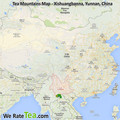My Life as A Tea Leaf - 凱聞
„Hui Gan 回甘, Hui Tian 回甜, Sheng Jin 生津, & Hui Yun 回韻…In literally term, Hui Gan, sometimes referred to as Hui Wei, is to reflect sweetly on a past event. Borrowing from the term 'to reflect', Hui Gan in tea is, simply put, a reflection on the sweetness of the tea - when one drink the tea, when the tea slides through the cavity of the mouth into the throat, there comes, after a short while, a sweetness that rises up from the throat. This sweetness is sometimes accompanied with a fragrance. Do not keep the upper and lower mouth pressed together when sipping tea, but create a cavity instead by lowering the jaw. Let the tea wash over the entire inside of the mouth, and then direct the tea to slide from the sides of the jaw into the throat. While holding the empty cavity, breathe out instead of in after you swallow the tea, there is warmth in the breath accompanied by a fragrance, and the same fragrance that rises up from the throat. This is Hui Gan.“
Quotes Tags: Pu-erh, China, Tea infusion, Experiencing tea
Theme
Tea by region
We will help you with tea selection.
Do you like quality loose tea?
We will help you to find the right one for you. Be inspired by tea ratings of other tea lovers. Rating stars could help you.


Review your cup of tea.
Review the tea you are drinking and help other tea lovers to find the right cup of tea.



Teas
BaDa 2013 - blind tasting set 1
 1 review
1 reviewthe pressed leaves aroma is strong and fruity, the taste is bitter, nutty, almond, fruity, fresh, balanced,...
2013 White 2 Tea New Amerykah
 2 reviews
2 reviewsThis puer tea cake is made from a 2013 pure Spring blend of gushu [old tree] material from the Menghai...
Sheng 2013 Blind Tasting Set
 1 review
1 reviewBuy only teas you like not teas you think you like! This is a blind tasting set of all pu-erh.sk spring...
Quotes
„Possibly the most nebulous of tea’s qualities are ascribed to 茶氣 [chá qì] — a tea’s “energy.” Most readers will probably be familiar with at least some of the wide ranging effects it is attributed with. Practically any physical or mental stimulus outside of the mouth, nose, and throat falls into the realm of cha qi.“



 Shops
Shops Share on Facebook
Share on Facebook












